Tusk vs Juncker on Migration
Adelina Marini, December 19, 2017
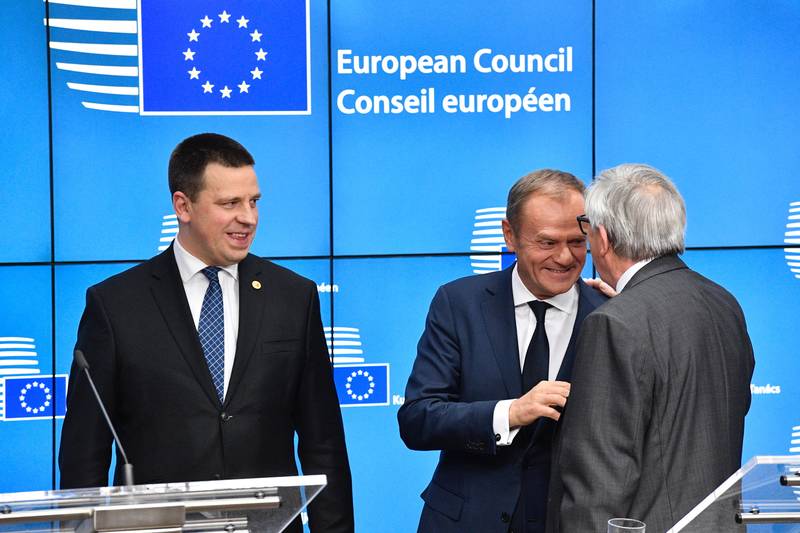 The closer the European elections are coming the intenser the inter-institutional conflict becomes, skillfully mitigated by genuine laughter and acid jokes. The winter EU summit in Brussels, on 14-15 December, was the first vivid clash between the leaders of two European institutions - the European Commission and the European Council. The tension between the veteran of European politics Jean-Claude Juncker (Luxembourg, EPP) and the rebel Donald Tusk (Poland, EP) has been smoldering ever since the election of the two in 2014 but with their mandates drawing to an end the situation is getting tenser but in the same time quite funny from a media point of view.
The closer the European elections are coming the intenser the inter-institutional conflict becomes, skillfully mitigated by genuine laughter and acid jokes. The winter EU summit in Brussels, on 14-15 December, was the first vivid clash between the leaders of two European institutions - the European Commission and the European Council. The tension between the veteran of European politics Jean-Claude Juncker (Luxembourg, EPP) and the rebel Donald Tusk (Poland, EP) has been smoldering ever since the election of the two in 2014 but with their mandates drawing to an end the situation is getting tenser but in the same time quite funny from a media point of view.
Institution wars - Tusk strikes back
The conflict between the two broke precisely on the issue that has divided the EU since 2015 - migration. This coincided in time with this year's premier of the latest episode of the eternal saga Star Wars. Disagreement between Mr Tusk and Mr Juncker on the way a solution should be sought on this contentious issue is old, but a week before the European Council it turned into a real institution war. The beginning of the conflict was in October when the leaders of the member states adopted Donald Tusk's Leaders' Agenda. The former Polish prime minister wanted with this document to take the bull by the horns by putting on the table the most controversial issues which the leaders have been avoiding so far in order to keep the fragile unity that appeared in the Union after the Brexit referendum.
It is hard to see any other reason bringing up issues that cause significant splits right when the Brexit negotiations are entering a decisive phase other than a desire to report a successful mandate. The mandates of both leaders end in 2019. Jean-Claude Juncker has already announced officially that he would not stand for a second term as head of the Commission but Donald Tusk is right at the heyday of his political career, and given his isolation in his homeland Poland, he probably relies on continuing his path at European, or other level.
There were two sensitive issues on his calendar for the December summit. The first was migration, and the second was the future of the euro area. After the leaders adopted Tusk's agenda, the European Commission published on 7 December its own position on the external and internal dimension of the migration problem, thus firing the first shot at the European Council reminding the leaders in two quotes of the commitments they made. The first one is from the Rome declaration and goes: "We will make the European Union stronger and more resilient, through even greater unity and solidarity amongst us and the respect of common rules (…) We pledge to work towards a safe and secure Europe: a Union where all citizens feel safe and can move freely, where our external borders are secured, with an efficient, responsible and sustainable migration policy, respecting international norms".
The second quote is from a speech by President Donald Tusk of 21 September, in which he says that the external aspect of migration policy needs to be consolidated, to improve the capacity for returns of illegal migrants, and to reach durable solutions in reforming the asylum policy. The clash between the two leaders is on assessing the efficiency of the measures implemented so far. According to the Commission's analysis, the lessons from the past few years are that unilateral actions do not deliver significant results, they are more expensive, and undermine the benefits of Schengen. The time is ripe to move forward from ad hoc decisions toward a stable asylum framework, which will be integrated in a European migration policy.
The Commission insists that the relocation scheme is successful. So far, more than 32 000 people have been relocated from Greece and Italy in other EU countries. The Commission believes that with its resettlement programme the pressure of illegal migration has been significantly reduced, and a legal path has been created for international protection. Under this scheme, and under the deal with Turkey, 26 000 people have been resettled. In September, the Commission set a new target of 50 000 and believes that it is within reach. Since the beginning of the migration crisis, the Commission proposed several legislative initiatives but progress varies and it is entirely dependent on ideological rifts going along the axis east-west, as Donald Tusk put it. A comprehensive reform of the Dublin regulation has 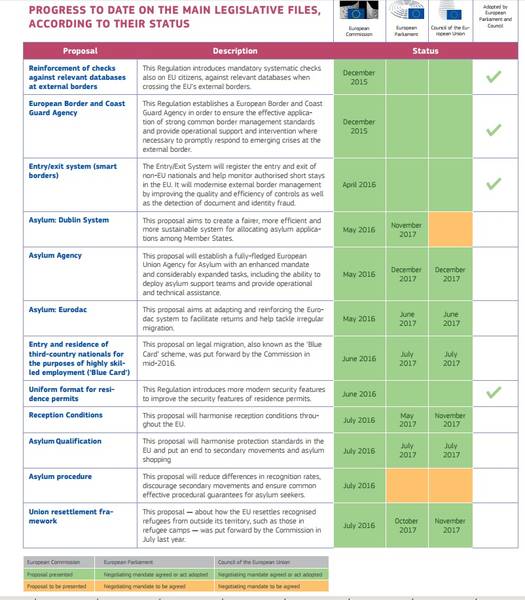 been proposed, together with amendments to the regulations on asylum, and to the reception conditions directive.
been proposed, together with amendments to the regulations on asylum, and to the reception conditions directive.
The Commission also proposed the European asylum assistance office to be transformed into a full-fledged European Asylum Agency. Some of these proposals are close to adoption, such as the European Asylum Agency, and the reform of the European database Eurodac. There is progress also on the resettlement framework and the reception conditions directive. The reform of the Dublin regulation is stuck. The Commission believes that all these legislative initiatives must be viewed as a package because they are interlinked. In addition, it wants the balance between responsibility and solidarity to be maintained as the latter is the most controversial part of this reform.
The Commission proposed a calendar of its own, according to which it is possible by March 2018 the proposals on establishment of an asylum agency and on Eurodac to be adopted. Also by March, it is possible to reach a political agreement between the European Parliament and the Council on the qualifications regulation. And by May, it is possible to reach a political agreement between the EP and the Council on the reception conditions directive, and on the resettlement framework. By then, a mandate could be agreed for negotiations on the asylum procedures regulation. The Commission says it is realistic by April to agree on the broad outlines of an agreement on the balance between responsibility and solidarity, and during the EU summit in Sofia in May it is possible to agree on a negotiating mandate on the Dublin regulation. Reaching an agreement on the overall reform of the common European Asylum Policy is also possible by June, according to the Commission.
A week after the Commission, Donald Tusk published, again quite late, his traditional invitation letter to the leaders for the summit, which was accompanied by his vision of the migration crisis, which angered the Commission. Tusk's analysis is that the EU is capable of handling illegal migration only through full participation of all member states. The issue of mandatory quotas proved highly divisive, and received disproportionate attention, which is why Tusk considers the scheme completely inefficient. He posed several questions to the leaders to discuss at the summit, among which whether they agree with his diagnosis, or with the need of a special financing mechanism in the next multiannual budget.
Europe is a Christian continent
This approach enraged Migration Commissioner Dimitris Avramopoulos (Greece, EPP) so much that he called it anti-European. The debate in the European Parliament on the preparation of the EU summit was a vivid illustration of the division among the member states, and it even evolved as a cultural-religious spat. Commission Vice President Frans Timmermans (The Netherlands, S&D) underscored that an overall European approach is needed which includes not only border management and support for Africa, but also solidarity within the EU itself. "I firmly disagree with the statement that relocation, as an emergency response, has been ineffective. Over 30 000 people have been relocated. That is over 90% of all those eligible", said Mr Timmermans. He also appealed the Treaties to be a starting point.
The statement of the leader of the biggest parliamentary group, Manfred Weber (EPP, Germany), was surprising because it was entirely dedicated on the Christian roots of the European continent. "Our continent has Christian roots. Seventy-five percent of European citizens are Christians. My group is proud of this Christian legacy that we see in our churches but also in our traditions, and in our daily lives", said the German MEP. "If we look at the fundamental structures of our continent today - the idea of solidarity, the idea of subsidiarity, tolerance in dealing with one another, many of these fundamental values would be unthinkable without the Christian-Judeo history of our Continent", he continued winning applause from his colleagues. His statement could have also been made by a Visegrad country or one of the nationalist groups in the EP.
Manfred Weber was opposed by the leader of the third largest political group in EP, of the European Conservatives and Reformists. Syed Kamall (ECR, UK) addressed Mr Weber with the words: "Manfred, as a Muslim, I fully understand the Christian roots of Europe but you must not confuse that with Europe as synonymous to Christian. And when I see the lack of diversity in European institutions you have a long way to go to make those who are not standard, white Christian, European feel comfortable to live in Europe. You need to do more work and do not allow Brexit to blind you to that", he said and also received a round of applause.
Syed Kamall was talking about the article of Politico Europe which reveals that in the European institutions the famous diversity in Europe is just a myth. Around 1% of the staff in the European institutions are with a different religious or racial background. Diversity is the greatest in NATO, mainly because of Turkey and the US. According to a report by the European Fundamental Rights Agency, nearly 40% of respondents say they were victims of discrimination in the past years, and mainly when seeking a job. After Brexit, it is quite possible this one percent to evaporate completely.
Regretfully, during the three-hour long debate, no one spoke in defence of Mr Kamall's position. Most reactions were of indignation with Donald Tusk. Guy Verhofstadt (ALDE, Belgium) said he was completely shocked by his note. Gabriele Zimmer (far left, Germany) called the European Council's president's letter "dreadful". "The letter of Tusk I did find extremely irritating because, basically, at the same time as the Commission stands up for solidarity, goes to the ECJ, and makes infringement procedures, basically the Council, and Tusk comes and shoots the Commission in the back", said Ska Keller (Germany), leader of the group of Greens and the European Free Alliance.
Marcel de Graaf (The Netherlands) of the nationalistic and eurosceptic group Europe of Nations and Freedom said that mass migration was a threat to the survival of "our civilisation, of our security, of our culture. And these illiterate illegal fortune-seekers believe in a barbarism of Sharia and Koran. They come to the EU to benefit from our prosperity, and they do not contribute to our societies. They take without giving. This has to stop", he said and praised the Visegrad countries for defending their own traditions and culture, and for leading the resistance against Juncker and Timmermans. "They are the ones guiding Europe", added the Dutch nationalist, who entered the EP through the Dutch Freedom Party led by Geert Wilders.
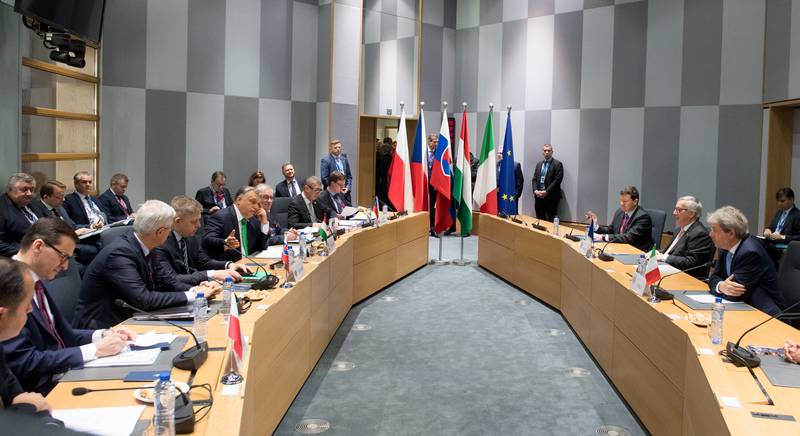 Before the beginning of the European Council on Thursday, there was a meeting of the Visegrad group with Italy Prime Minister Paolo Gentiloni and European Commission President Jean-Claude Juncker. The four Visegrad leaders, for two of whom this summit was a debut - Polish PM Mateusz Morawiecki and Czech PM Andrej Babis - committed to provide 35 million euros to the Italian authorities to help them handle the inflows of illegal migrants from North Africa. Hungarian PM Viktor Orban said that this was to keep the EU's unity, but Dutch PM Mark Rutte interpreted it as an attempt of the Visegrad group to bail itself out of the mandatory quotas.
Before the beginning of the European Council on Thursday, there was a meeting of the Visegrad group with Italy Prime Minister Paolo Gentiloni and European Commission President Jean-Claude Juncker. The four Visegrad leaders, for two of whom this summit was a debut - Polish PM Mateusz Morawiecki and Czech PM Andrej Babis - committed to provide 35 million euros to the Italian authorities to help them handle the inflows of illegal migrants from North Africa. Hungarian PM Viktor Orban said that this was to keep the EU's unity, but Dutch PM Mark Rutte interpreted it as an attempt of the Visegrad group to bail itself out of the mandatory quotas.
The German Chancellor Angela Merkel's reaction was similar. She said that she did not accept selective solidarity. The leaders' debate lasted until 1 o'clock in the night, and according to most participants there was no rapprochement of positions on the so called internal dimension of the problem. "We cannot accept that in most, if not all, areas we show solidarity with our partners in the EU, but there are areas where there is no solidarity. This is something we find unacceptable", Mrs Merkel said. Irish PM Leo Varadkar admitted that the exchange was quite frank, and that the leaders spoke openly with one another. He, as well as President Emmanuel Macron, approved Donald Tusk's approach the most contentious issues to be discussed informally.
"I think in politics sometimes, particularly in European politics we can be almost too polite sometimes, and too convivial, and accept too much of ambiguity. [...] I think it was a sign of maturity that we were able to be robust in our exchanges", Mr Varadkar added. Italian PM Paolo Gentiloni also disagreed with the possibility some countries to choose which policies they will join and which not. Croatian Premier Andrej Plenkovic took a cautious position between the two poles in the debate. According to him, the European principle of solidarity is especially important to Croatia. "This is the foundation of the European project, and has to spill over to the important issue of migration", he said pointing out in the same time that to Croatia it is very important all measures to be directed to the external dimension of migration policy.
The Bulgarian prime minister, whose country will on 1 January take over the rotating presidency of the Council, was in his usual geopolitical mood repeating his thesis that the EU is not sufficiently involved in geopolitics. "You see President Trump, President Putin, President Erdogan, the Arab League. Decisions are being taken which have some consequences afterwards. Where are we? What is today's dispute? Between Juncker and Tusk, and therefore between all of us. They are leading our wars, they are using our oil reparations, and we will kill each other over how much money to give and how many migrants to take, whereas it is evident that the peoples, especially in the frontline countries, do not like this", he said. It was not clear whether he is familiar with the work of EU's high representative for the foreign and security policy Federica Mogherini (Italy, S&D), or he disapproves her achievements on international scene.
The solution, he said, is the EU to have "very strong and fast foreign policy", and its borders to be protected "the way they used to be long ago". By "long ago" he means the times when there were still national borders, and especially the border between the east and the west. The big intrigue, however, was between Donald Tusk and Jean-Claude Juncker at the end of the two-day summit. The president of the European Council believes that the migration debate was successful because it confirmed "the hierarchy of our aims", which is that external border protection and stopping illegal migration come first. Mandatory quotas continued to be a contentious issue but, according to Mr Tusk, the temperature has dropped significantly. "If only for this reason, it was worth raising this topic", he said.
European unity for the sake of inter-institutional balance
Donald Tusk admitted, though, that compromise will be difficult. Jean-Claude Juncker patiently awaited his turn to say that whether migration policy was successful or not depended on the point of view, and again bombarded with facts. Out of 35 245 eligible people 32 683 individuals were relocated, which is more than 80%. "I don't know why we think that relocation could be a threat to civilisation in Europe. But talking about 32 000 people, I think Europe and its member states are certainly capable of absorbing 32 000 individuals. So, I think we need to calm things down a bit on this point and get less excited", Mr Juncker urged. Donald Tusk's vexation was visible. Asked by a German journalist whether after Germany's harsh reaction and other states' he changed his position, Tusk unusually sharply and almost aggressively asked for clarification as he did not understand the question.
Then he said he had not at all changed his mind. On the contrary. The harsh reaction was an illustration that the issue of mandatory quotas is very important but is not a solution to the problem. Besides, he added, it is extremely time-consuming. Regarding accusations that he took the side of the Visegrad countries, Tusk said he took no one's side. Then he shot two rabbits with a single bullet. First, he attacked those who believe that the problem can be resolved through the qualified majority voting (QMV) method, which the mandatory quotas were adopted with. "I am absolutely sure that QMV is an effective method to take decisions but, for sure, QMV is not a synonym of solidarity in politics", he said and then attacked the government in his own Poland.
"This is something especially important for me personally because solidarity was a kind of a brand of Poland, and I will be really disappointed if my country becomes example of something completely different", he said. Donald Tusk is founder of the Independent Student Association, which was part of the Solidarity movement for social rights. He was also a journalist in the newspaper published by Solidarity. The movement turned into a symbol of Poland's fight against the communist regime in the country supported by the Soviet Union. At the moment, Poland is under the Commission's legal strikes for undermining the rule of law. The Commission is expected this week to view the possibility of triggering Article 7 of the Treaty which can deprive a country of its voting rights in the Council. Both German Chancellor Angela Merkel and French President Emmanuel Macron said they would support such a measure.
Jean-Claude Juncker did not seem touched by that and again asked for the floor on the same question, although it was not addressed to him, but "this gives me, as a free man coming from a free country on a free continent, the possibility to add some considerations". Juncker underscored that the problem is not in mandatory quotas but quotas generally, and recalled that the first Commission proposal was for voluntary relocation. Besides, he said, there is a Council decision. "I'm sticking to the Council decisions unless they are changed, and I don't have the impression that they will be changed from today to tomorrow morning 11 o'clock", added the Commission head. He attacked Tusk's thesis of trying to keep unity saying that there was never unity on this issue in the first plae.
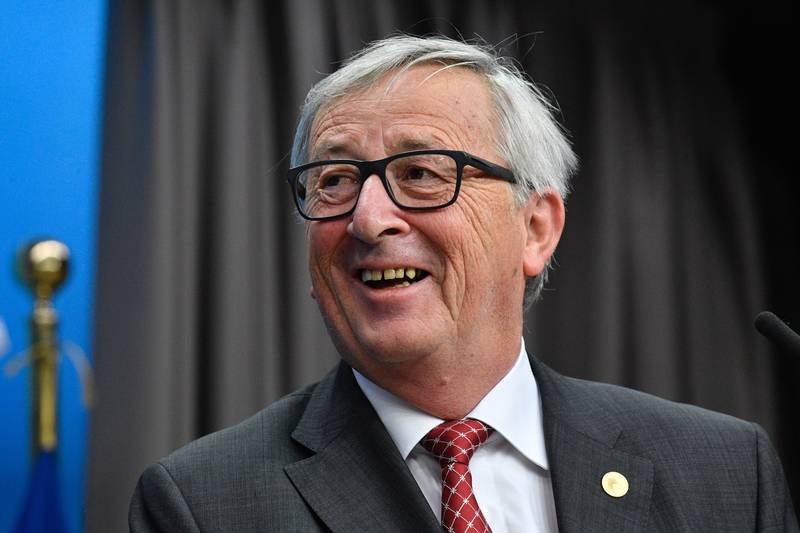 Especially funny was the exchange between the two on the issue of qualified majority when precisely the conflict between the two was the most evident. "I'm not the fan and not the best expert when it comes to QMV, I think it's Jean-Claude", said Tusk. Juncker answered that he, too, was not a fan of this method but it was in the Treaties and therefore can be used. He recalled that some leaders openly stated during the debate on Thursday evening that if there were no progress they would propose to move on to that procedure.
Especially funny was the exchange between the two on the issue of qualified majority when precisely the conflict between the two was the most evident. "I'm not the fan and not the best expert when it comes to QMV, I think it's Jean-Claude", said Tusk. Juncker answered that he, too, was not a fan of this method but it was in the Treaties and therefore can be used. He recalled that some leaders openly stated during the debate on Thursday evening that if there were no progress they would propose to move on to that procedure.
In the end, Jean-Claude Juncker extended a friendly hand to Donald Tusk saying he knew him "for centuries" and that he is in no way anti-European. "He is pro-European, very dedicated on European integration", said Juncker and added that Commissioner Avramopoulos's words were a misunderstanding, they were uttered in time of affection. Here, Donald Tusk insinuated that it is not very easy to be a commissioner in the Commission. Everything ended with Jean-Claude Juncker's sincere laughter but just a slight smile on Donald Tusk's face. The conflict will hardly end here. Under Tusk's agenda, the leaders will again discuss the toxic issue in February as the emphasis then will be how migration can be included as a priority in the next multiannual financial network, and in March there will be another attempt to find a compromise on the quotas issue. The goal is by June a final compromise to be reached.
A success or a failure for Tusk?
With his initiative, in the past days, Donald Tusk has definitely punched above his weight but, nevertheless, some positive outcomes can be outlined. The first is that the leaders definitely liked the format and the open discussion. Although it seemed the issue was forced on the table without any need (currently, it is quiet on the migration issue), in fact the debate was quite timely, and no matter how it will end it will be remembered as Tusk's attempt to keep Europe's unity at a crucial time in several aspects. First of all, in terms of the use of qualified majority voting which could cause significant split within the Union. Another problem is that next year the talks will begin on the next multiannual budget of the EU and, certainly, the issue of solidarity will emerge as a major one.
If consensus on migration is not found, this will have a significant impact on the financial redistribution and participation, and could affect directly the cohesion countries. Finding a solution on the most serious domestic EU problem before the European elections in 2019 could prove shrewd given the possibility more eurosceptics and nationalists to enter the EP, which is not at all improbable. In such a scenario, a compromise on this issue will be practically impossible. The conflict between Juncker and Tusk has another positive effect. It returned the Commission to a guardian-of-the-Treaties mode which, thanks to its politicisation by Juncker himself, remained in the background in the past years when, very often, compromises were made with rules for the sake of political unity.
This has now backfired with a potentially healing effect. Last but not least, no matter how irrelevant it seemed to put out of the closet the skeleton of migration right at the peak of the Brexit negotiations, in fact there was no better timing. After UK leaves, the EU wants to continue cleanly - without any opt-outs, opt-ins, exceptions, a la carte, and compromises with common policies. This cannot happen unless a solution is found to the most divisive issue, and to solidarity in a broader sense. The balance is that Tusk's idea generally was successful. What failed was the search for a compromise but hardly anyone expected a different outcome.
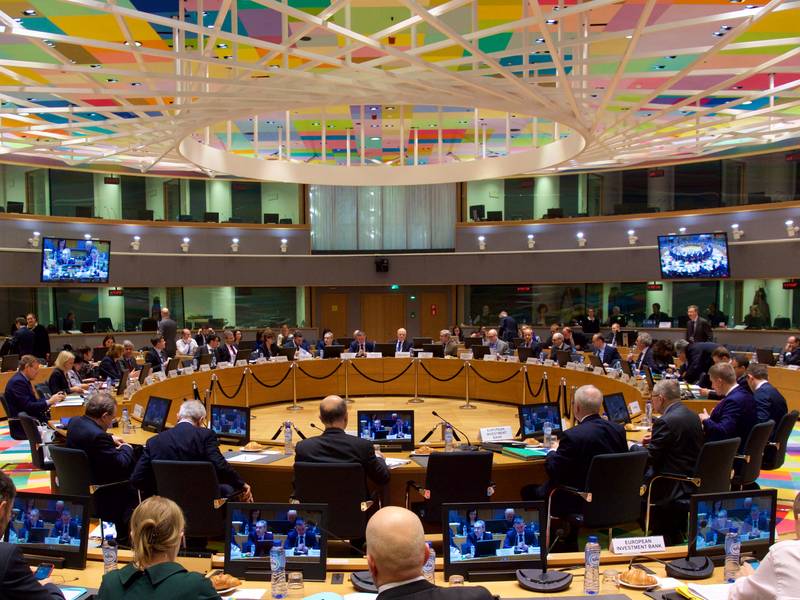 | © Council of the EU
| © Council of the EU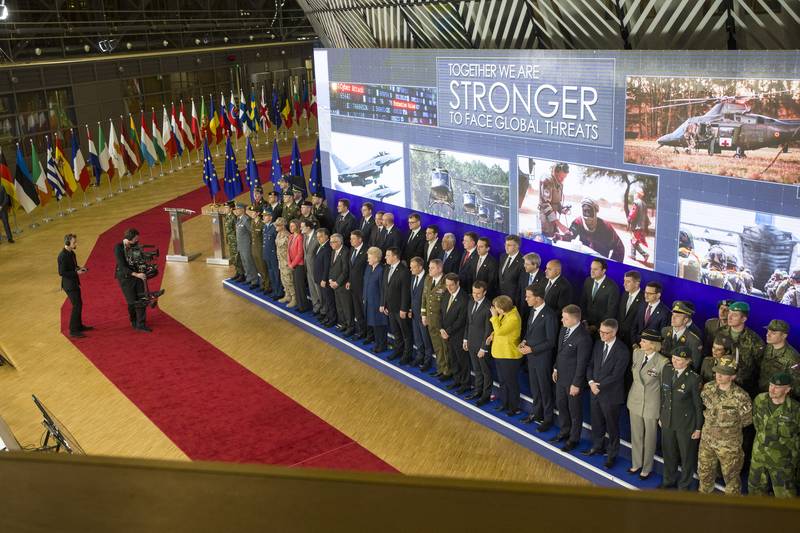 | © Council of the EU
| © Council of the EU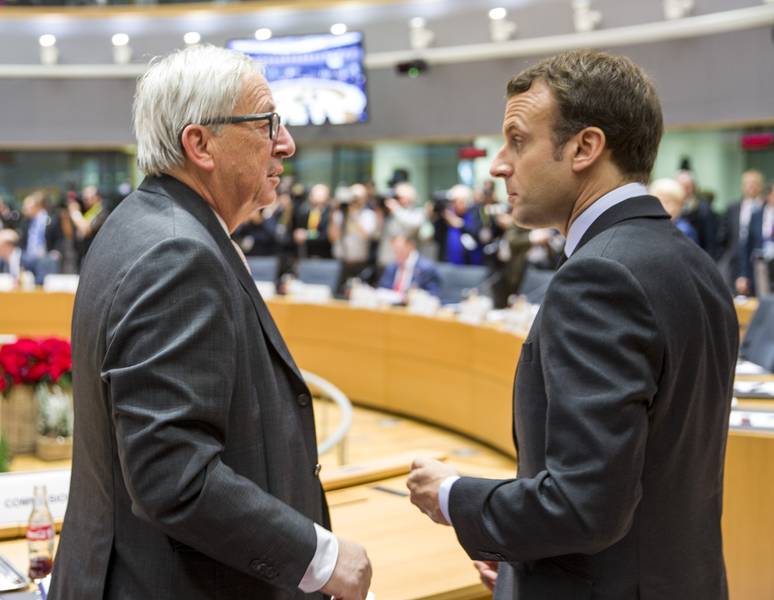 Jean-Claude Juncker, Emmanuel Macron | © Council of the EU
Jean-Claude Juncker, Emmanuel Macron | © Council of the EU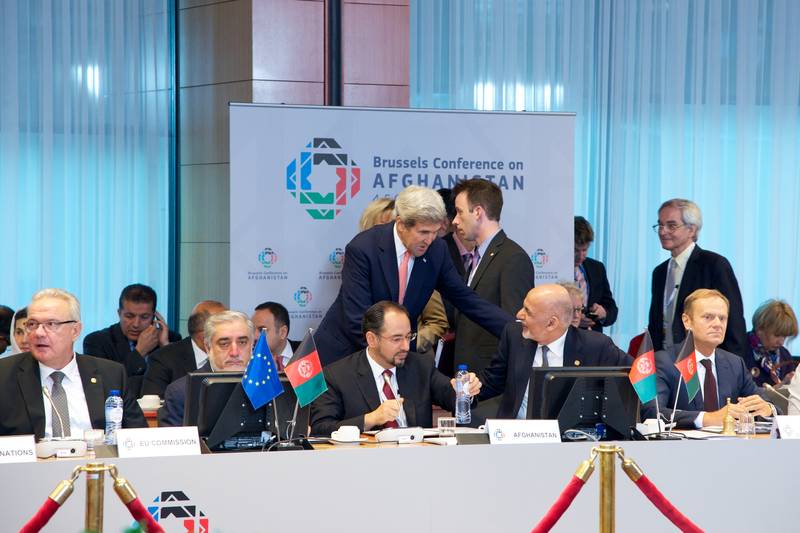 | © Council of the EU
| © Council of the EU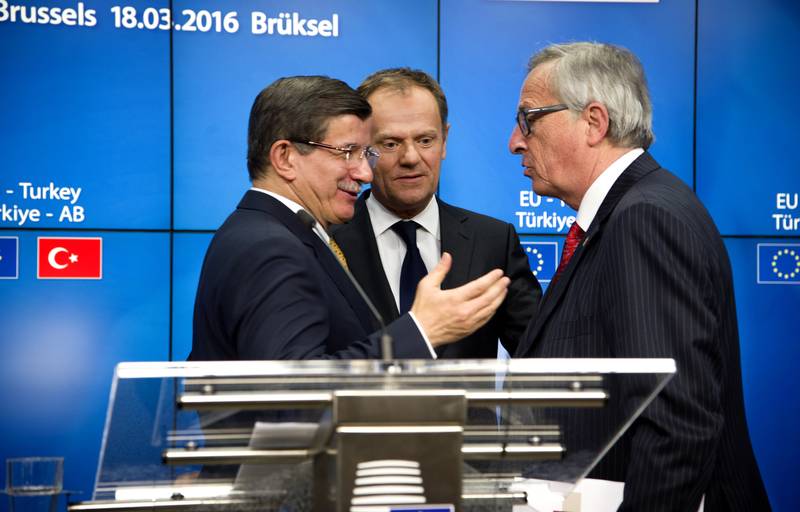 Davutoglu, Tusk, Juncker | © Council of the EU
Davutoglu, Tusk, Juncker | © Council of the EU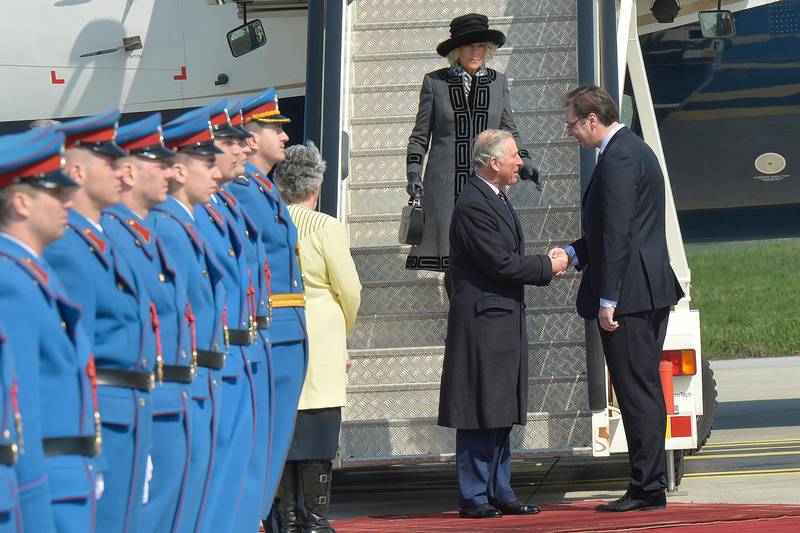 | © Vlada RS
| © Vlada RS